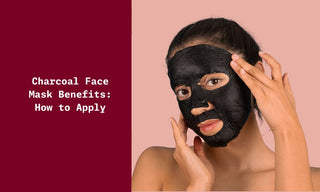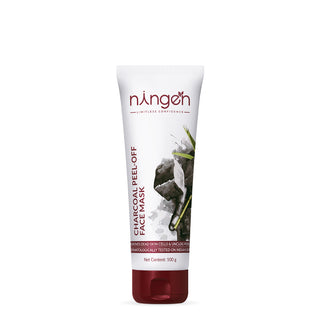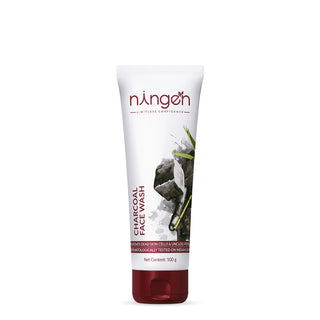“Charcoal face masks: the ultimate detox for your skin”....
Have you ever wondered why charcoal face masks have taken the skincare world by storm? From beauty influencers to dermatologists, everyone is raving about their incredible benefits. Charcoal face masks are not just a passing trend; they offer deep cleansing and revitalizing properties that can transform your skincare routine. In this blog, we will dive into the amazing benefits of using a charcoal face mask and provide you with a simple, step-by-step guide on how to apply it for the best results. Get ready to unveil your most radiant and refreshed skin yet!
In this Article;
- What is a Charcoal Face Mask?
- Charcoal Benefits for Face
- Benefits of Charcoal Face Masks
- Different Types of Charcoal Face Masks for Various Skin Types
- How to Apply Charcoal Face Mask?
- Precautions and Tips for Using Charcoal Face Masks
- Final Thoughts
- TL;DR(Too Long; Didn't Read)
- Frequently Asked Questions
What is a Charcoal Face Mask?
A charcoal face mask is a skincare product that uses activated charcoal to clean and purify your skin. It works by drawing out dirt, oil, and other impurities from your pores, leaving your skin feeling fresh and clear. You apply it to your face, let it dry, and then rinse it off to reveal a cleaner, smoother complexion.
Charcoal face masks have garnered popularity as a go-to skin care product, prized for their ability to address various facial skin concerns. With activated charcoal as a key ingredient, which is not the common charcoal found on the beauty aisle but rather a form of carbon processed to have small, low-volume pores, these masks are designed to potentially pull impurities from the skin surface, including environmental pollutants and excess oil.
Charcoal Benefits for Face
Charcoal on the face has become a popular trend in skincare, offering numerous benefits for various skin types. Activated charcoal, a key ingredient in many face masks and cleansers, is renowned for its deep-cleansing properties. It acts like a magnet, drawing out dirt, impurities, and excess oil, resulting in a clearer complexion. Regular use can help minimize pore size by removing debris and toxins, control oiliness by absorbing excess sebum, and prevent acne and blackheads by unclogging pores. Additionally, charcoal benefits for the face include detoxifying the skin by removing pollutants, leading to a fresher appearance and improved skin texture. Incorporating charcoal into your skincare routine can leave your face looking clean, clear, and healthy.
Also read: How to use vitamin E capsules on face?
Benefits of Charcoal Face Masks
Deep Cleansing
Charcoal masks draw out dirt and impurities from deep within the pores, providing a thorough cleanse.
Reduced Appearance of Pores
Regular use helps to minimize the visibility of pores by removing dirt and oil, resulting in smoother skin.
Blackhead Removal
Peel-off charcoal masks adhere to blackheads and remove them, clearing clogged pores effectively.
Oil Control
Charcoal absorbs excess oil, balancing sebum production and reducing the greasy appearance of the skin.
Detoxification
Charcoal masks detoxify the skin by drawing out impurities and environmental pollutants, promoting a clearer complexion.
Acne Prevention
By removing excess oil and dirt, charcoal masks help prevent acne breakouts and maintain clearer skin.
Brighter Complexion
Exfoliating properties reveal a brighter, more even skin tone by removing dead skin cells and impurities.
Soothing Inflammation
Some charcoal masks contain soothing ingredients like aloe vera, reducing redness and calming irritated skin.
Improved Skin Texture
Regular use improves skin texture, making it smoother and more refined.
Also read: Benefits of using facial toner for our skin.
Different Types of Charcoal Face Masks for Various Skin Types
Charcoal face masks have become a staple in many individuals' skincare routines, famed for their ability to draw out impurities from the pores. Made from common charcoal, these masks are often combined with other ingredients to cater to various skin types. Here we will explore the different types of charcoal masks suitable for oily/combination skin, dry skin, sensitive skin, and acne-prone skin, ensuring that you find the right mask that benefits your particular skin concerns.
Oily/combination skin
For those with oily or combination skin, charcoal masks that also incorporate an exfoliating agent, like salicylic acid, can be particularly beneficial. Salicylic acid is renowned for its ability to deeply penetrate the skin and dissolve the dirt and oils clogging the pores. When mixed with charcoal powder, which acts to adsorb toxins and impurities, this type of mask can help regulate sebum production, leading to a clearer complexion. Oily and combination skin types can benefit from using these masks 1-2 times per week, taking care not to over-dry the skin.
Dry skin
While charcoal might seem counterintuitive for dry skin due to its absorbing properties, there are charcoal masks specifically formulated with added moisturizers like hyaluronic acid or glycerin. These ingredients help to hydrate the skin while the charcoal gently removes impurities. Additionally, using lukewarm water to rinse these masks can prevent further drying. Dry skin types should use a moisturizing charcoal mask no more than once a week to avoid stripping the skin of its natural oils.
Sensitive skin
Individuals with sensitive skin must tread carefully when incorporating new products into their routine due to the risk of allergic reactions. Charcoal masks designed for sensitive skin often include soothing ingredients such as aloe vera or chamomile, which can calm irritation. It's crucial to choose a mask free from harsh chemicals or fragrances to reduce the chance of a reaction. A patch test is always recommended before applying a new charcoal mask to the entire face, and if tolerated, use sparingly to prevent irritation.
Acne-prone skin
Acne-prone skin can highly benefit from the detoxifying effect of charcoal face masks. The masks designed for acne often contain additional antibacterial agents like tea tree oil, which can help in reducing active pimples and prevent new breakouts. Charcoal's ability to pull out bacteria, dirt, and environmental pollutants from clogged pores may reduce the severity of acne. However, it should be noted that while there is anecdotal evidence to support the effectiveness of charcoal for acne, more scientific research is necessary. Acne-prone skin may use a targeted charcoal mask once or twice a week as part of a comprehensive skin care regimen.
The use of charcoal masks should be done with consideration to the unique needs of your skin type. By choosing a product that is formulated with the right ingredients for your skin, you can leverage the purity of this ancient material in the modern-day pursuit of healthier skin.
|
Skin Concern |
Recommendation |
|
Oily Skin |
Masks designed to control sebum and remove impurities. |
|
Sensitive Skin |
Hypoallergic masks with gentle formulations. |
|
Acne-Prone Skin |
Non-comedogenic masks to prevent clogged pores. |
|
Combination Skin |
Balanced masks that address both oiliness and dry areas. |
How to Apply Charcoal Face Mask?
Here is a step-by-step Guide to Applying a Charcoal Face Mask. Follow this to achieve a clear, radiant complexion.
Cleanse your face
Before applying a charcoal face mask, it is crucial to start with a clean canvas. Use a gentle cleanser that suits your skin type to remove any makeup, oil, dirt, and impurities from the skin surface. Pat your face dry with a soft towel to prepare your skin for the mask application. This step helps ensure the mask adheres properly and the charcoal can penetrate effectively to provide its full benefits.
Steam or exfoliate (optional)
Optionally, you can choose to steam your face or use a mild exfoliant before applying the mask. Steaming helps open up the pores, allowing the charcoal mask to reach deep-seated impurities. Alternatively, exfoliating removes dead skin cells that can hinder the performance of the mask. However, if your skin is sensitive or irritated, you may want to skip this step or use a very gentle exfoliating product to avoid causing further issues.
Apply the mask evenly and avoid sensitive areas
Using either a brush or clean fingertips, apply the charcoal face mask in an even layer across your face. Be cautious to avoid sensitive areas such as the eyes and lips, as charcoal can be drying and may irritate these regions. If using a peel-off mask, take care to apply it away from the hairline and eyebrows to prevent discomfort upon removal.
Allow the mask to dry and activate
After applying the mask, wait for it to dry completely. This usually takes anywhere from 10 to 20 minutes depending on the mask's formula and thickness of application. During this time, the charcoal is activated and binds to toxins, bacteria, and excess oils on the skin surface. Refrain from moving your facial muscles excessively to allow the mask to set undisturbed.
Rinse off the mask with warm water
Once the mask is fully dry, rinse it off with lukewarm water. If you've used a peel-off mask, gently peel it away from your skin starting from the edges. Follow with lukewarm water to ensure all remnants of the mask are removed. Rinse in a circular motion to help further cleanse and unclog your pores.
Moisturize your skin after removing the mask
To conclude the treatment, it's important to restore hydration to your skin. Apply a moisturizer that suits your skin type to replenish moisture and soothe the skin. Charcoal masks can be drying, so this step will help to maintain the skin barrier and provide a smooth finish to your skincare regimen.
It is always recommended to apply hydrating serum before applying moisturizer to lock in hydration for longer.
By following these steps, you can enjoy the benefits of a charcoal face mask, potentially achieving a clearer, purified complexion and reduced appearance of pores. However, noting the frequency of use is important—using a charcoal mask too often can strip the skin of essential moisture, so limit use to once or twice a week as per your skin's tolerance.

Also read: How to remove blackheads from nose?
Precautions and Tips for Using Charcoal Face Masks
Charcoal face masks have become a popular ingredient in skin care routines for their potential to remove impurities and achieve a clearer complexion. However, there are several precautions and tips to consider to ensure a safe and beneficial experience.
- Read the Instructions: Follow the guidelines provided by the product's manufacturer. Each charcoal face mask may have specific directions regarding application time and frequency of use.
- Avoid Sensitive Areas: Exercise caution around sensitive areas of your face, such as the eyes and mouth. Charcoal masks can cause irritation if applied too close to these areas.
- Protect Your Hair: Charcoal masks can stick to hair along your hairline and eyebrows. It’s wise to apply a small amount of petroleum jelly or a similar protectant to your hairline to shield it from the mask.
- Don’t Overuse: Using charcoal masks too frequently can lead to an over-drying of the skin, increased sensitivity, or irritation. Stick to the recommended usage – often once or twice a week for most skin types.
- Avoid Overly Dry Skin: If you have dry skin, charcoal masks may exacerbate the issue. Emphasize hydration and choose products designed for your skin type.
- Combination Skin Caution: If you have combination skin, apply the mask only on the oily areas to prevent drying out patches of your skin that are already dry.
- Listen to Your Skin: If you experience discomfort, itching, or burning upon application, wash the mask off immediately with lukewarm water and discontinue its use.
- Aftercare is Important: As previously mentioned, always moisturize your skin after using a charcoal face mask to replenish lost moisture.
By keeping these safety tips in mind, you can enjoy the benefits of a charcoal face mask without adverse effects.
Do a Patch Test Before Applying The Mask
A patch test is an important step before using any new skincare products, particularly for those with sensitive skin or a history of allergic reactions. A patch test helps determine how your skin will react to the charcoal face mask. Here is a simple process to conduct a patch test:
- Choose a small, discreet area of skin, such as behind the ear or on the inside of the elbow.
- Clean the area with mild soap and water, then pat dry.
- Apply a small amount of the charcoal mask to the area.
- Wait at least 24 hours. Keep the area dry and avoid touching it.
- Examine the spot for any signs of an allergic reaction, such as redness, swelling, itchiness, or irritation.
Does Charcoal Mask Remove Pimples?
Charcoal masks are often promoted as being able to remove impurities from the skin, including pimples. However, the effectiveness of charcoal masks in removing pimples may vary depending on the individual and the specific mask being used.
Charcoal is known for its ability to absorb toxins and impurities from the skin, which can help in clearing out pores and reducing the appearance of blackheads and whiteheads. Some people may find that using a charcoal mask helps to dry out existing pimples and reduce redness and inflammation.
However, it is important to note that charcoal masks may not be a cure-all for pimples. Pimples can have various causes, including excess oil production, bacteria, and inflammation. While charcoal masks may help in absorbing excess oil and unclogging pores, they may not target the underlying causes of pimples.
It is always recommended to consult with a dermatologist or skincare professional for personalized advice on treating and preventing pimples. Using a combination of skincare products, proper hygiene, and healthy lifestyle choices may be more effective in the long run for managing and preventing pimples than relying solely on charcoal masks.
Final Thoughts
Hope you found this article “Charcoal Face Mask Benefits: How to Apply” helpful. Charcoal face masks offer numerous benefits that can transform your skincare routine by deeply cleansing, detoxifying, and improving the appearance of your skin. By following the proper application steps and taking necessary precautions, you can effectively incorporate charcoal face masks into your regimen for a clearer, more radiant complexion. Remember to choose the right mask for your skin type and to use it as recommended to avoid any potential side effects. With consistent use and proper aftercare, charcoal face masks can become a valuable addition to your skincare arsenal.
TL;DR(Too Long Didn't Read)
Charcoal face masks have gained popularity for their deep cleansing and detoxifying properties, making them a staple in skincare routines. These masks help to remove impurities, control oil, reduce the appearance of pores, and improve overall skin texture. To apply, start with a clean face, optionally steam or exfoliate, apply the mask evenly, let it dry, then rinse off with warm water, and moisturize afterward. Choose a mask suitable for your skin type and use it once or twice a week. Always do a patch test to avoid adverse reactions.
Frequently Asked Questions
Q1. What are the main benefits of using a charcoal face mask?
Charcoal face masks provide deep cleansing, reduce the appearance of pores, remove blackheads, control oil, detoxify the skin, and can prevent acne, brighten the complexion, soothe inflammation, and improve skin texture.
Q2. How often should I use a charcoal face mask?
It is generally recommended to use a charcoal face mask once or twice a week, depending on your skin type and tolerance.
Q3. Can charcoal face masks help with acne?
Yes, charcoal face masks can help prevent acne by removing excess oil and impurities from the pores, which are common causes of breakouts.
Q4. Are charcoal face masks suitable for all skin types?
Charcoal face masks can be beneficial for various skin types, but it's important to choose a mask formulated for your specific skin needs and to do a patch test before full application.
Q5. How do I apply a charcoal face mask correctly?
Start with a clean face, optionally steam or exfoliate, apply the mask evenly, let it dry completely, rinse off with warm water, and follow with a moisturizer.
Q6. Can I use a charcoal face mask if I have sensitive skin?
If you have sensitive skin, look for charcoal masks with soothing ingredients like aloe vera and avoid those with harsh chemicals. Always do a patch test before full application.
Q7. Do charcoal face masks remove blackheads?
Yes, peel-off charcoal masks can adhere to blackheads and remove them when the mask is peeled off, effectively clearing clogged pores.
Q8. What should I do if a charcoal face mask irritates my skin?
If you experience irritation, wash off the mask immediately with lukewarm water, discontinue use, and apply a soothing moisturizer. Consult a dermatologist if irritation persists.
Q9. Can charcoal masks dry out my skin?
Charcoal masks can be drying, especially if overused. Always follow up with a moisturizer to replenish lost hydration and maintain the skin barrier.
Q10. Why is it important to do a patch test before using a charcoal face mask?
A patch test helps determine if your skin will react negatively to the mask, preventing widespread irritation or allergic reactions when applied to your entire face.









